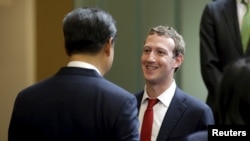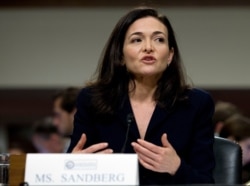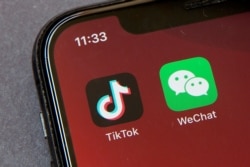Facebook CEO Mark Zuckerberg once embraced China as a key potential market for his company. But Beijing never let Facebook operate inside its internet firewall, which helped turn Zuckerberg into one of the most vocal American technology leaders to speak out against what many see as the Chinese Communist Party's threat to internet freedom.
Now, the internet mogul who studied Chinese and famously hosted China's internet chief at Facebook headquarters in 2014, is warning that Beijing's policies pose a threat to American technology.
At a Senate hearing in late July, Zuckerberg told senators that it was "well documented that the Chinese government steals technology from American companies."
Growth in Asia, not China
As of the second quarter of 2020, Facebook had 2.7 billion monthly users, making it the world's largest social networking platform by a large margin.
Data over the past few years have shown that the largest user market for Facebook is in the Asia-Pacific region.
A few years ago, as Facebook aggressively expanded overseas, China was its top target. Facebook had been banned in China since 2009. If Zuckerberg could get the ban lifted, Facebook could quickly gain some 700 million potential users. Zuckerberg went to great efforts to establish ties with Beijing, visiting with top officials and delivering a speech in Chinese at Tsinghua University in 2015.
He posted on Facebook that he was reading a Chinese science fiction novel.
He posted a widely circulated photo of himself running in Tiananmen Square on a smoggy day. He also reportedly asked President Xi Jinping at a White House dinner to name his then-unborn daughter.
Facebook around this time became interested in acquiring the video app Musical.ly, which focused on the Chinese and American markets. But in 2017, Chinese technology giant ByteDance successfully acquired the app for $800 million and merged it with its TikTok platform. The result was a social media sensation, which now boasts around 500 million users from 150 different markets.
Shut out of the Chinese market yet again through ByteDance's acquisition of Musical.ly, while facing growing political pressure at home over its content moderation policies, Facebook abruptly began to change its stance toward China.
In September 2018, Facebook COO Sheryl Sandberg testified before the Senate Intelligence Committee that Facebook would only operate in a country that respects its "values," and specifically said China failed to meet this standard.
Facebook's relations with China cooled further. In March 2019, Zuckerberg pledged that his social media platform would always put "privacy first," and announced that Facebook would not establish a data center in China — a "country that has been violating privacy and free speech." China's first requirement for foreign internet companies is that all user data must be stored in China.
By October that year, Zuckerberg's position appeared to harden further. Speaking at Georgetown University in Washington, Zuckerberg again went on the attack.
"While our services, like WhatsApp, are used by protesters and activists everywhere due to strong encryption and privacy protections, on TikTok, the Chinese app growing quickly around the world, mentions of these protests are censored, even in the U.S. Is that the internet we want?"
Investigating TikTok
Last week, the Wall Street Journal published a report that Zuckerberg had met with Senator Tom Cotton, Republican of Arkansas, last September. A month later, Cotton and Chuck Schumer, a Democrat, issued a joint letter asking intelligence agencies to investigate TikTok.
The report also stated that Zuckerberg warned President Donald Trump at a private dinner last October that the values and technological dominance of Chinese internet companies such as TikTok pose a significant threat to U.S. technology companies. Since then, the U.S. government has launched a national security investigation into TikTok.
Responding to these reports, Facebook issued a statement that Zuckerberg had not suggested that TikTok be banned.
Josephine Wolff, assistant professor of Cybersecurity Policy at Tufts University, says Facebook's current approach does not necessarily mean that the company has given up on the Chinese market.
"I think that both of these are compatible in some ways for Facebook. Both wanting to do business in China and being concerned about some of these Chinese firms and apps," Wolff said. "I don't know if that's necessarily a sign of them giving up doing business there, but it's clearly a sign that they have some reservations about the Chinese government and the ties between the Chinese tech industry and that government."
Some analysts also believe that Facebook's recent maneuvering is a simple matter of Facebook attempting to preserve its social media dominance.
Arun Vishwanath, Avant Research Group CTO, thinks there are more fundamental causes.
"The micro level competition, the competition between Facebook and TikTok for the same market, I think that's only a smaller part of the problem," Vishwanath said. "There's the issue of trade parity, and a very legitimate security concern here."
He argues that Zuckerberg's concerns about the consequences of Chinese censorship are real.
"A great firewall has already spilt the internet, one for 1.4 billion people, and one for the rest of the world. And I think those differences are now getting even more profound."
Facebook's current China policy is certainly in line with the Trump administration's increasing focus on the security threat posed by Chinese high-tech companies.
Concerns about Chinese cyber espionage are not new. Wolff says since 2013, policymakers have been concerned about "the idea that the Chinese government was sort of buying up U.S. companies, stealing intellectual property, other proprietary information to benefit Chinese companies."
The difference now, she says, is that the United States is taking a harder line, and is willing to impose outright bans on Chinese companies that pose a threat. And Zuckerberg has said that may be going too far.
Speaking about Trump's ban on TikTok, Zuckerberg recently told Buzzfeed, "I just think it's a really bad long-term precedent, and that it needs to be handled with the utmost care and gravity whatever the solution is … I am really worried … it could very well have long-term consequences in other countries around the world."






